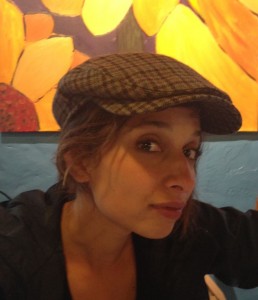This month, we’re incredibly excited to hear from Yasmine Mustafa: highly established entrepreneur, co-leader of the Philadelphia chapter of Girl Develop It, the brains behind a new line of self defense products for women, and all-around kickass female. Every city has their band of women who pave the way for a brighter future for girls and women of all ages, and Yasmine is right there serving on the line of duty. How does one navigate through the ever-evolving tech industry unscathed, and with the right tools in her arsenal to turn around and help other women confidently push past the revolving door? We asked Yasmine all about how she got her start as a coding whiz and entrepreneur, and why it’s so important to provide a support system for women in the tech industry.
Philly PR Girl: Tell us how you first heard about Girl Develop It and how you became involved?
Yasmine Mustafa: I was running my first software startup when I quickly discovered I was in over my head. I thought I could find a developer, tell him/her what I wanted, he/she would code it for me, and I would be ready to launch. Naïve, right? I quickly discovered that’s not how it works and that I needed to learn how to communicate with developers better. I tried learning how to code on my own but I gave up soon after because I had no one to turn to when I would become frustrated after getting stuck on something.
I was on Twitter when I first heard about Girl Develop It (GDI). It was co-founded by two women in NYC (Sara Chipps & Vanessa Hurst) who discovered first-hand that many women dropped out of their CS degrees or didn’t want to get into IT because they were afraid to ask questions or didn’t feel like they belonged. They decided to teach a women-only class and GDI was born. I signed up for a 4-weeknight class they were running and took the bolt bus there and back. The commute wasn’t ideal but for the first time, everything clicked. I understood what was going on and even breezed ahead on certain parts. One day after the class was over, I was feeling on the top of the world and I approached one of the co-founders (Sara Chipps) about expanding into Philly. She got in touch 6 months later and I started the Philadelphia chapter shortly after.
PPRG: How has GDI expanded and evolved both locally and nationally since you first joined?
Yasmine Mustafa: When we geared up in Philly, we focused on entry-level types of classes. WordPress, HTML/CSS, JavaScript – in fact, we ran those classes repeatedly for most of the first year. As a beginner developer myself, it made sense. Those were the subjects I understood. I went to local tech meetups and talked about GDI to build awareness of what we were doing. I have to say how supportive the attendees were. Keep in mind the room would be comprised dominatingly of men. They volunteered to teach or TA and spread the word to the women in their lives. We started getting into back-end languages the second year, even expanding into mobile development. Corinne Warnshuis joined as co-leader (now the Executive Director of GDI). It was at this time we became the second largest tech Meetup in Philly, which is significant when you consider the gender gap. We brought on a co-organizer and branched out to 7 tracks the third year (2014), launching classes in front-end development, back-end development, WordPress, design, mobile, and even business.
Most recently, we established a volunteer team that consists of Ashley Chapokas, Kristi Centinaro, Suzie Nieman, LeeAnn Kinney, and Sam Provenza. Each of them has an inspiring story on how they got into tech and are role models for our members. They are helping us round out our classes with study groups and social events, as well as engaging the local community.
Every week, I see the impact GDI has had first-hand. Women moving from non-technical to technical careers, getting raises as they expand their skills, speaking at conferences, contributing to open source projects, and even attending technical events. This past WordCamp Philly had more female attendees and speakers than the previous five.
When the Philly chapter started, we were in a handful of cities. Now, GDI is in 37 cities and growing. We’re projected to be in 50 by the end of the year. More importantly, around two to three thousand women take GDI classes across the country EVERY MONTH.
PPRG: What do you love most about tech and coding?
Yasmine Mustafa: I have always enjoyed making things. When I was little, I would take things apart and try to put them back together. In high school, wood shop was my favorite class. There’s this satisfying feeling you get when you build something – whether it’s physical or by coding. Most recently, I’ve become immersed in how technology is being used to do good in the world, to leave an impact and make a difference in people’s lives. E.g. 3D printers are used in developing nations to create expensive medical supplies, even homes. It’s helping blind people see the first time and disabled people walk again after an accident. The list goes on and on.
It’s why I recently started useROAR.com, a social impact company that creates fashionable, safety jewelry and mobile technology to empower women to feel safer in cities and college campuses.
PPRG: What advice would you give young women who are interested in getting into this field, e.g. how to navigate the basics, get an education, and start out their career?
Yasmine Mustafa: Start. Go to tech meetups. Talk to female developers. Get online and take a free course from Codecademy, LearnStreet or CodeAvengers. Sign up for Coursera classes. Come to a GDI event.
It’s a question we get a lot. Liz Abinante, the chapter leader of GDI Chicago, wrote a post titled “So you think you want to be a web developer?” on it and I have one about my journey with resources here. I would recommend finding a mentor, even an informal one. Someone in the technology field to turn to when you have a question, are unsure of what to do next or are frustrated.
There’s never been a better time to be a woman wanting to get into technology. It’s an issue numerous organizations are solving and because of the high demand; the work flexibility makes it easier for those who want to work from home and the pay isn’t shabby, either.
PPRG: What would you say your all-time favorite GDI Meetup event has been thus far? What are some events you’re looking forward to in the near future?
Yasmine Mustafa: My favorite GDI meetup? That’s a difficult question to answer. I can say that there are various elements I enjoy seeing. In every class, we do introductions where the teacher has students go around, provide their name, talk about what they do and why they’re taking the class, and then answer a silly question (e.g. if you could star in a movie, what would it be and why?). That last question is meant as an icebreaker and I get a kick out of the answers and seeing members bond over commonalities or the humor. I also like the interactive session when members practice the skills they’re learning, most especially when they help each other or when I see that “I got it” look on their faces after solving something.
We are currently planning our three-year anniversary party and I’m very much looking forward to it. It will be on September 19th and we have a fun agenda – save the date!
PPRG: Why do you feel that it is so important to empower women in the workforce, tech industry and beyond?
Yasmine Mustafa: Oh boy, I can go on and on with this answer. In short, the opportunities are not equal and studies have shown again and again that empowering women leads to positive changes for families, communities, and economies.
Focusing on the tech industry in particular, not enough women are being recruited into the industry and the number of females involved or interested in technical jobs has been declining year after year. Research shows girls are as interested in technology as boys until middle school. By the time they’ve graduated, they see tech positions as being male-dominated or too advanced for their skillsets and don’t feel welcome as a result. We need more women in tech for a number of reasons. Studies have shown that diversity increases innovation and creativity, improves problem solving and leads to better business decisions and products. The U.S. Dept of Labor predicts there will more than 1.4M technology jobs available by 2018. With the number of people being interested in the industry as a whole dropping (mostly women), the demand will be greater than the supply and that could lead to a big problem.
PPRG: You mentioned that you recently began working with useROAR, a social impact company that produces “fashionable safety accessories” that help to defend women in instances of assault, rather than arm them with intimidating self-defense products. Tell us about the company’s mission and the ways in which you have become involved.
Yasmine Mustafa: A young woman was raped one block from my apartment in a busy Philly neighborhood at 10 p.m. when she went out to feed the meter last November. When I learned about it the next day, the idea of using technology in products that women already wear in order to be more safe was born.
During my research, I found women are intimidated of conventional self-defense tools like mace and taser guns for the fear of being overpowered and having them used against them. Coupled with the desire to place emphasis on prevention and eliminating rape culture to truly make a difference, I started working on the concept earlier this year.
We’re engineering a small module embedded with a high-pitched alarm and a powerful flashing light. The goal is to distract and disorient an attacker while attracting attention to yourself to either push the assailant to run away or buy yourself time to get away. After the button is pressed and the light and sound are launched, a text message is sent to their pre-programmed contacts notifying them of an emergency with a link to their location. It also automatically activates a call to 911. It’s integrated with a mobile application that enables anyone to be more aware of their environment. The ROAR app shows safety tips, crime-ridden areas in real-time, and more.
For each safety device purchased in the U.S., one is donated to a woman in a developing nation. The proceeds are invested in educational programs to spread female empowerment and promote a culture of respect for women. The overall mission is to reduce the incidents of assaults against women worldwide.
We’re currently planning a crowdfunding campaign in the Fall and you can stay updated on our progress by signing up at useROAR.com.
By signing up at useROAR.com, you’ll be notified of the company’s Kickstarter campaign and may even be able to try out the product before it launches. If you’re interested in getting involved with Girl Develop It, join in the Meetup group and check out their list of upcoming events, follow the Philadelphia chapter on Twitter (@GDIPhilly) and mark your calendars for the 3rd Anniversary Party on September 19th!
Special thanks to Yasmine for chatting with us. If you want to learn more about Yasmine and her work follow her on Twitter @myasmine or visit her website: myasmine.com. Until next month…




